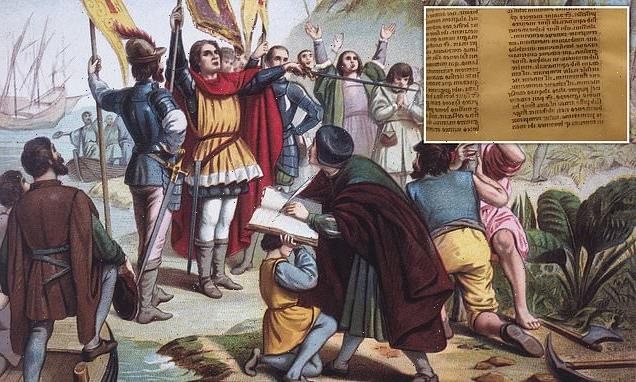Spanish sailors knew about America 150 years BEFORE Christopher Columbus discovered the continent, researchers claim
- Reference to land ‘where giants live’ mentioned in writings of a Milanese friar
- Italian academics came across passage while studying the Cronica Universalis
- Text written by Galvaneus Flamma around 1340 and was studied for the first time
- Prof says it provides evidence of early circulation about land west of Greenland
Spanish sailors knew about America 150 years before Christopher Columbus discovered the continent, researchers have claimed.
A reference to Genoan sailors knowing of a land west from Greenland ‘where giants live’ has been uncovered in the writings of a 14th-century Milanese friar.
Italian academics came across the passage while studying the Cronica Universalis – written by Galvaneus Flamma around 1340 – for the first time.
Referring to ‘Markland’, meaning Forestland, the Dominican friar writes: ‘In this land, there are buildings with such huge slabs of stone that nobody could build with them, except huge giants.
‘There are also green trees, animals and a great quantity of birds. However, no sailor was ever able to know anything for sure about this land or about its features.’
The text provides evidence that reports of the American continent were circulating in the Mediterranean region before Columbus’s discovery, say researchers.
Spanish sailors knew about America 150 years before Christopher Columbus discovered the continent, researchers have claimed. Pictured: Colombus Taking Possession of the New World at San Salvador, circa 1492
Paolo Chiesa, who led the research at the University of Milan, told The Times: ‘This astonishing find is the first known report to circulate in the Mediterranean of the American continent, and if Columbus was aware of what these sailors knew it might have helped convince him make his voyage.’
The professor of Medieval Latin Literature added: ‘Nordic legends describe the trips, but until now there has been no evidence that word of this land spread to the Mediterranean.’
Auctioned at Christie’s in 1996 for $14,950 (£10,980), the Cronica Universalis was first drawn attention to in 2013, by Sante Ambrogio Céngarle Parisi.
It is preserved in a single manuscript held by a private owner and remains unpublished, although an edition is planned.
In his essay, published in the journal Terrae Incognitae, Mr Chiesa writes: ‘The Genoese might have brought back to their city scattered news about these lands, some real and some fanciful, that they heard in the northern harbors from Scottish, British, Danish, Norwegian sailors with whom they were trading.’
Columbus set sail on August 3, 1492 from the Spanish port of Palos with hopes of finding a route to the fabled riches of Asia.
Along with three ships – the Nina, the Pinta and the Santa Maria – Columbus and roughly 100 men embarked on the journey that took them to the opposite side of the world – and far from their original destination.
On October 12, 1492 the ships made landfall in what is now the Bahamas and later in the month, Columbus pulled spotted Cuba and thought it was mainland China.
Auctioned at Christie’s in 1996 for $14,950 (£10,980), the Cronica Universalis was first drawn attention to in 2013, by Sante Ambrogio Céngarle Parisi
And two months later, the ships pulled ashore, which Columbus thought might be Japan.
On the second voyage in 1493, Columbus intentionally sailed back to the New World and landed in Puerto Rico and he completed two more voyages after.
The explorer is famed for discovering the ‘New World,’ but neither he nor his men actually stepped foot in America.
He died on May 20, 1506 and was buried in the Spanish city of Valladolid, though he had asked to be buried in the Americas.
Popular belief suggests Columbus was born in Genoa, Italy, while others say he was a royal prince, a song of a Portuguese noble land and exiled king.
There is also speculation that the navigator was Scottish, Catalan or Jewish.
Source: Read Full Article







